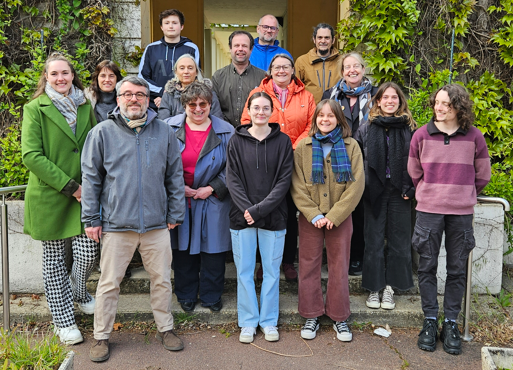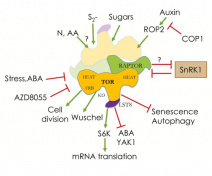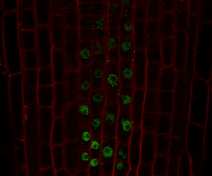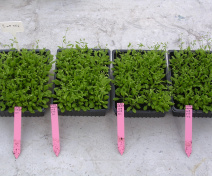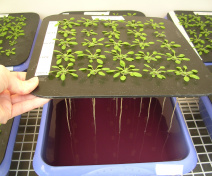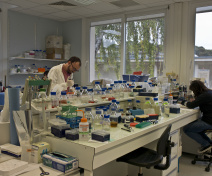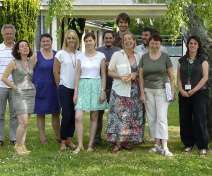The NUTS team studies nutrient signaling in plants with a particular emphasis on nitrogen signaling, nitrate transport and whole plant nitrogen management. Our main research interest is to investigate how plants orchestrate their response to changes in availability or demand of nutrients.
Further key words : Arabidopsis, Brachypodium, barley, wheat, nitrogen, TOR kinase, NIN-like proteins, NRT2, biostimulants
In particular, we seek to understand how plants adapt nitrate uptake via high and low affinity nitrate transporters, how they regulate nitrogen assimilation and development through the action of the conserved NLPs transcription factors and how they modulate growth and metabolism in response to nutritional cues through the TOR kinase signaling pathway.
Biological Question
In particular, we seek to understand how plants adapt nitrate uptake via high and low affinity nitrate transporters, how they regulate nitrogen assimilation and development through the action of the conserved NLPs transcription factors and how they modulate growth and metabolism in response to nutritional cues through the TOR kinase signaling pathway.
Biological Question
The adaptation of plants to their environment requires tight regulation of metabolism and growth. This is particularly true for plant responses to the availability of nutrients such as nitrogen (N) which is essential for plant development and crop yield but which concentration largely fluctuates in the soil. Nitrogen is quantitatively the most important nutrient for plants. Soil N content is often a limiting factor for plant growth and crop yield and the rise of mineral N fertilization in the last century has allowed the development of intensive agriculture.
Nevertheless, global environmental changes, which impact on N assimilation, urge the need for a better understanding of plant N use. Indeed these changes are associated with growing concerns about the financial and environmental costs of N fertilization and a growing population, which increases the food demand and limits arable land surfaces. Therefore, it is now a major worldwide concern to maintain or increase plant yield while reducing N fertilization.
Nevertheless, global environmental changes, which impact on N assimilation, urge the need for a better understanding of plant N use. Indeed these changes are associated with growing concerns about the financial and environmental costs of N fertilization and a growing population, which increases the food demand and limits arable land surfaces. Therefore, it is now a major worldwide concern to maintain or increase plant yield while reducing N fertilization.
The final goal of our research is to understand the molecular processes and the regulation of plant nitrogen nutrition. We wish to understand how nitrogen assimilation, storage and transport is regulated and how it contributes to crop yield and plant development. We use an integrative approach, ranging from genomic and molecular biology to plant physiology. This knowledge could then be harnessed to allow a constant yield (biomass and seed production and quality) even under low nitrogen supply.
With this aim, we investigate the molecular and genetic bases that govern the responses of plants to nutrient availability focusing our research on six aspects:
- The nutrient-driven conserved TOR (Target of Rapamycin) protein kinase signaling pathway (project 1)
- Specific features of nitrate transport in Brachypodium (project 2)
- Nitrate signaling in Arabidopsis, Brachypodium and barley with emphasis on the role of NLP transcription factors (project 3)
- The coordinated responses between N constraint and other stresses (combined stresses in particular with water stress) (project 4)
- The impact of nitrogen signaling and use for the beneficial interaction between microorganisms and plants (project 5)
- Study of the mode of action and targets of biostimulants (project 6)
- Specific features of nitrate transport in Brachypodium (project 2)
- Nitrate signaling in Arabidopsis, Brachypodium and barley with emphasis on the role of NLP transcription factors (project 3)
- The coordinated responses between N constraint and other stresses (combined stresses in particular with water stress) (project 4)
- The impact of nitrogen signaling and use for the beneficial interaction between microorganisms and plants (project 5)
- Study of the mode of action and targets of biostimulants (project 6)
Models, tools and methods
Our studies use targeted and global genetic, biochemical, molecular physiological and cell biology-based approaches. We are mostly working with the model species Arabidopsis and Brachypodium, while extending our projects more recently to other cereals such as barley and wheat.
Societal and economical impacts
- Improvement of nitrogen use efficiency with the goal to enable the reduction of fertilizers and to improved growth and yield.
- Increase the resistance to stress under contrasting nitrogen supply.
- Optimizing fertilizers quality, quantity and time of application.
- Identification of the targets of biostimulants in plants.
- Increase the resistance to stress under contrasting nitrogen supply.
- Optimizing fertilizers quality, quantity and time of application.
- Identification of the targets of biostimulants in plants.
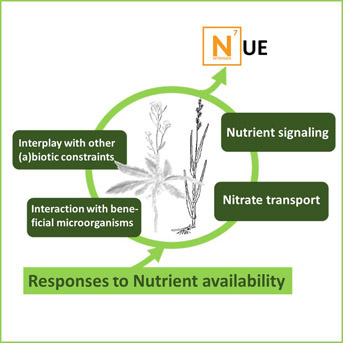
Leaders:
Anne Krapp
Thomas Girin
